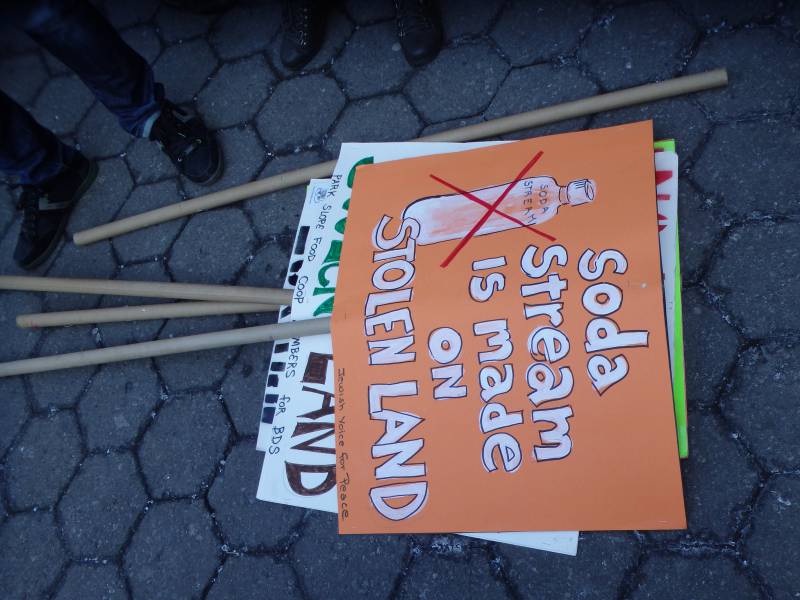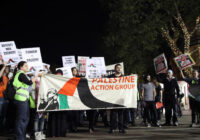Israel’s attacks on the legality of BDS have global implications for civil liberties and the right to protest.
In August 2014, at the height of Israel’s latest incursion in Gaza, Steven Salaita was dropped from his tenure at the University of Illinois over his public criticism of Israel. Tweets by the professor appeared online at a time when Israel’s actions attracted worldwide condemnation for the high number of Palestinian deaths—over 2,000, including some 500 children.
Critics of the university, which received threats from donors ready to withdraw their funding, decried the move as an indictment of free speech. University officials explained that Salaita’s comments were “uncivil” and that they “promote malice.”
In September of the same year, Salaita’s appeal for reinstatement was almost unanimously rejected by the university board.
The implications for free speech in this situation are obvious—be prepared to toe the line or face accusations of anti-Semitism and/or summary dismissal—and it is a clear testament to the power of Israeli hasbara that has for decades successfully conflated criticism of state policies with anti-Semitism.
It seems problematic for educators to decipher what is acceptable to teach under this banner of “civility”: Is it uncivil to Americans to describe the cruel nature of slavery? Or to discuss moral objections to the Guantánamo Bay detention camp? At what point does philosophical and moral questioning spill over into incivility?
Whether you regard Salaita’s comments as fair criticism or malicious hate speech could be debated ad nauseum, but what is interesting is the way it was handled by certain wealthy donors to the university. By exerting financial pressure, they were able to assert their political agenda over the institution. One correspondent wrote to Phyllis Wise—the university chancellor, who has since resigned amid an ethics investigation—to say: “We will now cease our annual contributions to the university … We will encourage others to join us in this protest, as perhaps financial consequences will sway you even though morals, common sense and decency did not.”
Arguably, such “financial consequences” are the result of a legitimate process available to any individual or group to demonstrate disapproval in the face of a political opponent.
What is BDS?
This logic underpins the Boycott, Divestment and Sanctions (BDS) movement, applying collective pressure without violence, employing your right as a consumer to choose which organizations you see as worthy of benefaction. Rather than wealthy individuals exerting their agenda over an institution through monetary means, BDS relies on mass support that leverages the financial clout of many to encourage changes in Israeli policy. While we should respect the decision of these university donors to withhold their money in the face of what they see as injustice, when BDS supporters use similar measures against Israel it is decried as immoral, anti-Semitic and soon to be illegal, if the Knesset and the Israeli lobby in Washington have anything to do with it.
Loose associations of the BDS movement have been around for decades, campaigning in support of the Palestinian cause to boycott or divest from Israeli settlement businesses, inspired by Nelson Mandela’s ultimately victorious initiative to end South African apartheid. It was in 2005 that the movement became something more official, bringing together “the largest coalition of Palestinian unions, mass organisations, refugee networks and NGOs” under the title, “The Palestinian BDS National Committee.” Very much a grassroots movement, BDS was known to the Knesset but largely ignored for many years, until the recent surge in momentum in the wake of the latest round of horrific civilian casualties in Gaza.
Recent months have seen various international organizations dissociate themselves from trade with settlement companies. After being targeted for years by the BDS campaign, French corporate giant Veolia is reported to have sold off nearly all of its business interests in the region, while Barclays Bank is no longer listed as a shareholder for Israel-based defense contractor Elbit Systems.
It is not just multinationals that are joining the campaign. In 2014, a collection of 20 South African businesses cancelled contracts with G4S after being approached by the Palestine Solidarity Campaign over the security firm’s complicity in human rights abuses at Israeli prisons.
Perhaps the biggest blow came when French telecoms giant Orange, though officially denying any political motives, expressed its intention to cut ties with the Israeli firm Partner after pressure from rights groups in France.
The boycott is also a cultural one. Entertainers Lauryn Hill, Roger Waters and Spanish singer Marinah have all cancelled tours in Israel, officially citing their support for BDS in their decisions. Tourism in Israel was reported to have dropped a massive 25% in the first six months of 2015, compared with the same period the previous year. Many publications have reported nearly a 50% drop in the amount of foreign investment in Israel since 2014, and student and other groups (including Christian, Muslim and even Jewish organizations) across the United States and Britain have passed motions supporting BDS.
Israel’s Response
Such collective action is clearly of some concern to the Knesset, which has amped up its campaign against BDS in recent months. In June, Gilad Erdan, Israeli minister for strategic affairs and information, confirmed that the Israeli government has allocated some $26 million and created ten new positions dedicated solely to fighting the BDS campaign. The Israeli justice minister, Ayelet Shaked, has spearheaded research into legal action against activists and campaigners for blacklisting the Jewish state, condemning their efforts as an existential attack on the nation. Her research concluded that Israeli officials could bring about “civil and criminal lawsuits for damaging Israeli trade, and for discrimination and racism, based on laws in various countries.”
Shaked, a famously uncompromising right-wing member of the Knesset, drew attention to herself after she posted a quotation from Uri Elitzur, a leading Israeli journalist and advisor to Prime Minister Benjamin Netanyahu, on her Facebook page, referring to infant Palestinians as “little snakes” and calling for genocide; although these comments were quickly removed, it can leave one in no doubt of the position of some on the right who advocate attack as the best form of defense. How much defense is needed from the beleaguered Palestinians in the Occupied Territories is the perpetually debated bone of contention.
Shaked’s position that BDS is “delegitimizing” Israel is backed up by several leading political figures, including the education minister and leader of Shaked’s Jewish Home party, Naftali Bennett, who vowed the government would “boycott our boycotters,” as well as Netanyahu, who recently spoke at an American Israel Public Affairs Committee (AIPAC) conference, where he denounced BDS activists as “anti-Semites” and “bigots.”
Such is the power of the pro-Israel lobby that the US-Israel Trade and Commercial Enhancement Act is now a precondition of the controversial Transatlantic Trade and Investment Partnership (TTIP) agreement, tying rejection of the boycott movement against Israel to future US trade agreements with the European Union. A press release from the office of Congressman Peter Roskam, sponsor of the bill, states: “Over the past several years, a growing contingency of countries across the globe have sought to isolate and delegitimize Israel through BDS. This bill leverages ongoing trade negotiations to discourage prospective US trade partners from engaging in economic discrimination against Israel.”
Moreover, by using the phrase “in Israel or territories controlled by Israel,” the bill conflates the two and, in so doing, blithely glosses over the internationally recognized illegality of the settlement process and the logical assumption that if these settlements are illegal, then trade with them must be as well. Israel’s insistence on such a measure speaks volumes about its ostensible commitment to dismantling settlement outposts, a move agreed back in November 2007 in a joint declaration by the Israeli government and the Palestine Liberation Organization (PLO) under the auspices of the US government.
Similar moves to defeat BDS can be seen at the level of American state legislature, as seen recently in Tennessee, Indiana and Illinois, where Senate resolutions have been put forward decrying BDS as “advocating elimination of the Jewish state.”
The Aims
The BDS website outlines their aims, calling on the world “to launch broad boycotts, implement divestment initiatives, and to demand sanctions against Israel, until Palestinian rights are recognized in full compliance with international law.” Specifically, those demands are outlined as the following:
1) Ending [the Israeli government’s] occupation and colonization of all Arab lands occupied in June 1967 and dismantling the Wall
2) Recognizing the fundamental rights of Arab-Palestinian citizens of Israel to full equality
3) Respecting, protecting and promoting the rights of Palestinian refugees to return to their homes and properties as stipulated in UN Resolution 194
Such demands are fully compatible with international law regarding both human rights and rules governing conduct during war. They also show the movement to be pro-Palestinian in emphasis, despite claims it is in fact anti-Israeli and indeed anti-Semitic. It is that distinction that is at the heart of the problem, because if it is possible to misconstrue these aims as destructive rather than productive, then it is all too easy to define the democratic right to protest as malicious hate speech, racism or general discrimination.
The Centre for Constitutional Rights stated recently that the Senate resolutions as seen in Tennessee et al should be opposed in order to “protect the right to engage in boycotts that reflect collective action to address a human rights issue,” and that “the US Supreme Court has declared it protected speech and associational activity.”
Once again, however, it appears that economic gains trump civil liberties, and it is the force of money that allows for the preconditions to be imposed on the TTIP deal, as well as dictating the dismissal of Steven Salaita. Only the attack has now moved from the individual, to the only real weapon of the oppressed against entrenched power structures: collective action.
There is a disturbing, ironic perversity that seeks to make democratically enshrined, non-violent collective action illegal by calling it delegitimizing, which ingeniously undermines the legality of the BDS campaign while simultaneously hijacking the moral high ground. Worryingly, the right of Israelis themselves to boycott companies based in occupied lands over their flouting of international law was removed in 2011, when the Supreme Court upheld an Israeli anti-boycott bill.
The Right to Protest
Many Israelis regularly speak out against their government’s policies, including rights groups Breaking the Silence and B’Tselem, not to mention the thousands of activists who recently took to the streets after the killing of 18-month-old Ali Dawabsheh.
The implication is that such is the frenzied paranoia of the Israeli right-wing that the democratic rights of their own citizens are far less important than the state’s ability to do whatever it wants—whether that is settlement-building on former Palestinian land, killing innocent people in Gaza or at the quotidian level, making life unbearable for Arab-Israelis.
This is not the kind of action that any true democracy should be engaging in. Indeed, it is an abuse of civil rights of the highest order. Not simply content to prevent boycotting within Israel, the Middle East’s “only democracy” is currently engaged in the removal of democratic rights of global citizens by seeking to sue BDS supporters using each respective country’s discrimination laws. Of course, the United States is helping Israel to do so by ensuring that these countries conform or else risk losing a valuable trade partner.
Perhaps such measures represent a sort of peace offering from President Barack Obama, since tensions have grown between his administration and Netanyahu’s government over the Iranian nuclear deal. But whatever the reason, the result is the same: the suppression of the right to protest at home and abroad.
The views expressed in this article are the author’s own and do not necessarily reflect Fair Observer’s editorial policy.
Photo Credit: The All-Nite Images / U.S. Department of State
 We bring you perspectives from around the world. Help us to inform and educate. Your donation is tax-deductible. Join over 400 people to become a donor or you could choose to be a sponsor.
We bring you perspectives from around the world. Help us to inform and educate. Your donation is tax-deductible. Join over 400 people to become a donor or you could choose to be a sponsor.
Support Fair Observer
We rely on your support for our independence, diversity and quality.
For more than 10 years, Fair Observer has been free, fair and independent. No billionaire owns us, no advertisers control us. We are a reader-supported nonprofit. Unlike many other publications, we keep our content free for readers regardless of where they live or whether they can afford to pay. We have no paywalls and no ads.
In the post-truth era of fake news, echo chambers and filter bubbles, we publish a plurality of perspectives from around the world. Anyone can publish with us, but everyone goes through a rigorous editorial process. So, you get fact-checked, well-reasoned content instead of noise.
We publish 2,500+ voices from 90+ countries. We also conduct education and training programs
on subjects ranging from digital media and journalism to writing and critical thinking. This
doesn’t come cheap. Servers, editors, trainers and web developers cost
money.
Please consider supporting us on a regular basis as a recurring donor or a
sustaining member.
Will you support FO’s journalism?
We rely on your support for our independence, diversity and quality.







